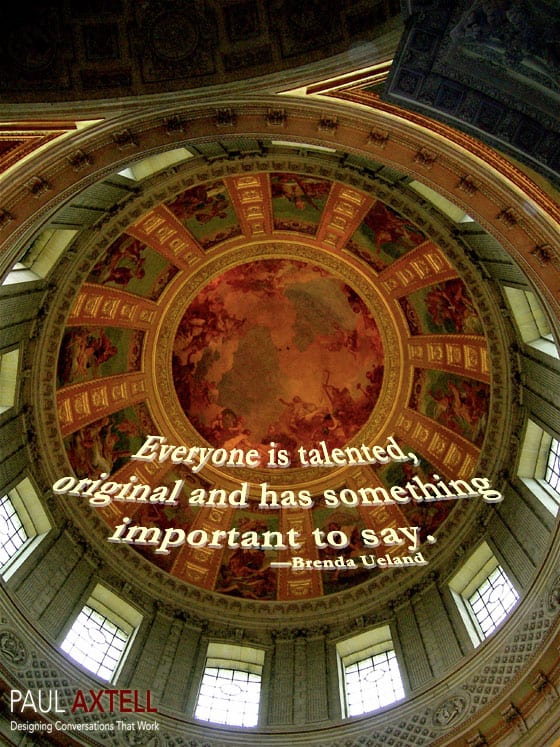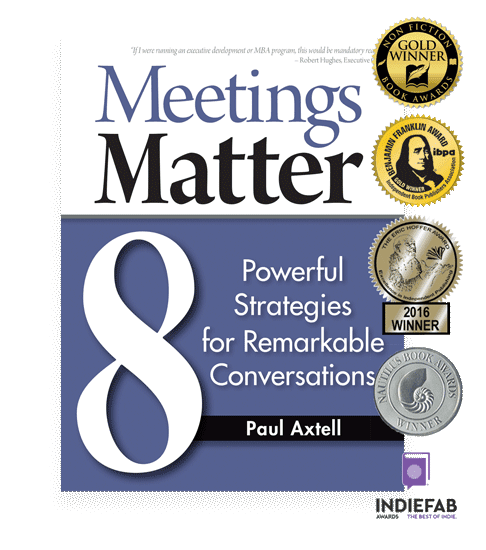
While I have definite views and ideas on how to improve conversations and meetings, I also know that there are many other views and other thoughtful folks looking at the same issue of improving how we work together in a group setting.
Because of this, I’ve decided to start a new series for the blog, which will highlight a variety of experts (some I already know, some I don’t) and center around the topic of meetings. My hope is to revolutionize the idea of group conversation, one perspective and one interview at a time.
I’m delighted to begin this new Q&A series by speaking with Elise Keith, co-founder of Lucid Meetings, a complete online tool that helps organizations pursue their goals by making meetings more productive, more efficient, and more rewarding.
Here is what Elise had to say about what makes a great meeting, Lucid’s core customer base and why one-on-one meetings are in the spotlight right now.
Q: I love the word “lucid.” Why did you choose it for your company’s name?
A: It’s our goal to provide software that makes it easy for people to organize and run worthwhile meetings as a regular habit. Many people (but not all) understand what they should do, but when it comes time to actually schedule a meeting with their team, they’re too busy or too overwhelmed by all the advice or too afraid to try something new.
We seek to provide a clear way for everyone to get the basics right and achieve a demonstrable, documented result. Complete, well-organized meetings with the push of a button. The word “lucid” is meant to convey this clear and pragmatic ideal. A Lucid meeting should make sense: with a stated goal, useful agenda, and written results.
We’ve also had fun competing with all the “lucid dreaming” search engine results, and tried to enjoy Lucid absinthe cocktails once at a team meeting. Sadly not recommended.
Q: When it comes to meetings, what do you think are the most important aspects for leaders to embrace?
A: We believe leaders need to understand that:
- Meeting skills are a core competency for all collaborative work.
- Meeting proficiency creates a strong competitive advantage in knowledge work.
- Meeting skills can and must be trained.
- Meeting design should be a part of all process design.
The increasing information deluge and the rate of business change means that teams have to meet frequently to keep up; individual actors just can’t do it all. This makes effective meetings a crucial business activity to manage—it’s just not something that’s nice to have anymore.
None of this makes excellent social media fodder, though, and we are first and foremost selling software. We get much better marketing results with small, specific how-to material. For example, our most popular blog post explains how to write a meeting invitation email.
So, while we relish this higher view of the conversation, our impact comes through embedding best practices in software, making it possible for people to start holding better meetings without having to think about it too hard.
Q: How have you learned to deal with the comment, “What you write about meetings is obvious.”?
A: I hear this most often from trained facilitators, but not so much from customers. Our writing tends to reach a less sophisticated audience and always ties in the unique challenges of an online meeting experience.
For our audience, we frankly don’t need to be particularly novel. This is actually one of the inspirations for the business: best meeting practices haven’t changed dramatically in decades (if ever?). And yet, most people run terrible meetings. We concluded that they lack either training, time, or the will to change, and that software could help.
Q: What would you ask people to track and measure each week to make a difference in what they observe regarding meetings?
In the software, we track all kinds of hard metrics for the data geeks. Some of this can help: use of time, accurate planning, active participation… it all provides clues.
That said, my absolute favorite method is a combination of the agile ROTI and a plus/delta survey asked at the end of a meeting. We actually include this in the eBook and in the software. The combination provides a safe way for people to quickly express enthusiasm (or lack thereof) for the meeting and offer comments.
I know some facilitators like to track more details about what’s going on in the meeting, but for everyday working meetings, I think too much tracking is a burdensome distraction.
Q: Tell me about one-on-one meetings.
A: One-on-one meetings are hot business at the moment, especially in the startup community. We’re developing templates to support these meetings.
We’re seeing a lot of anxiety in the late GenX and millennial crowd as they enter managerial roles and realize that:
- They have to do one-on-ones.
- If they do them wrong they’ll become the next set of “bad bosses.”
- They have no idea how to succeed.
Kissmetrics recently put on a webinar about one-on-ones that had over a thousand registrants. A thousand registrants for a webinar about meetings!
Q: After years of working with people in the workplace who reported how much difference the ideas made in their relationship with their children, I wrote a book taking some of the same principles in the meetings book and applying them to family life (Ten Powerful Things to Say to Your Kids). It’s made me curious about what other meeting experts have found. Tell me about raising children and improving family conversation based on what you know about meetings.
A: This is an interesting question, and not one that comes up much in the software world.
Between us, my husband and I have five children ranging from age 31 to age 2 (almost 3). We actually run a weekly family meeting with the three still at home (I love reading the notes my 10-year-old takes!) and find that when we miss these meetings, we experience the same issues with frazzled connection and lost alignment that you see in working teams. We also host a bi-weekly family dinner with all the local extended family. I think our work on meetings helped us better understand and better teach our children about the importance of strong connections.
This one is really a good candidate for a long chat over tea!
—–
Elise Keith is one of the co-founders of Lucid Meetings. Before starting Lucid, she worked to deliver collaboration products for international standards organizations and the legal e-discovery industry, where the importance of a well-run meeting (and the consequences of a failed meeting) were made abundantly clear.
She now divides her time between work on Lucid Meetings, parenting her 3 young children, and consulting with teams on how to inspire the effective meeting habit in their organizations.



















































